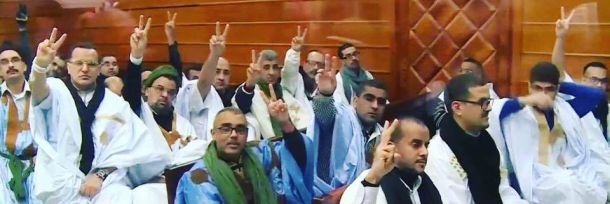
The military court in Rabat has convicted 25 Saharawi activists to shockingly tough sentences. All were arrested in relation to the Gdeim Izik protest camp; a peaceful manifestation disputing the Saharawi people’s continual marginalisation in their occupied country.
After more than a week of hearings, the military court of Rabat has convicted 25 Saharawi citizens to appallingly tough sentences; 9 of the defendants are condemned to life imprisonment, 14 others have been convicted to sentences ranging from 20 to 30 years. Two have been sentenced to two years.
Some of the convicts are known human rights activists and have in the past openly voiced their pro-independence stance. One of them is Sidahmed Lemjiyed, the President of the Saharawi Committee for the Protection of Natural Resources, who has now been sentenced to life. Mr. Lemjiyed appears as the third from the right in the above picture.
In the days leading up to the trial, the European Parliament had called for the release of the Saharawi political prisoners. Amnesty International had issued a statement, labelling the trial flawed from the get-go.
European observers who have witnessed the trial, noted many anomalies; delay of detention without trial beyond the legal limit of 12 months, trial of civilians in a military court, confessions obtained under torture and signed with a thumb print only, etc.
WSRW strongly condemns the verdict. “This verdict underlines how well placed the critique from the European Parliament earlier this month was”, says Erik Hagen of Western Sahara Resource Watch. “The international community must wake up to the injustice committed to Saharawis who’ve done nothing more than call for their legitimate rights”.
Most of the now convicted activists were arrested on the backdrop of the Gdeim Izik protest camp; an unprompted massive gathering of thousands of Saharawi citizens in defiance of their social and economic discrimination under Moroccan occupation, in the autumn of 2010.
"One had hoped that the 2010 protest of dismayed Saharawis would be an eye-opener to those governments and companies claiming to help Morocco in developing the territory it illegally occupies", Hagen stated.
He underlined that these leading human rights activists have for instance been clear opponents of the EU's illegal fisheries in occupied Western Sahara, and that the repeated message from the protest camp was that the plunder of the territory must stop.
"If the EU now enters into a new fisheries agreement offshore the territory, it would be insulting and showing disdain of those Saharawis who are now convicted to life time sentence for peacefully protesting that same plunder", stated Hagen.
After a couple of weeks, the 2010 protest camp was attacked and burnt to the ground by the Moroccan army. The majority of the convicts were arrested in the days following the camp’s dismantlement, during a complete media black-out; the Moroccan government did not allow NGOs, media, foreign observers or even the UN on the scene.
Life sentences confirmed for political prisoners
The Moroccan Court of Cassation yesterday confirmed the harsh sentences rendered against the so-called Gdeim Izik prisoners. The group took part in the mass protest on socio-economic marginalisation in Western Sahara in 2010.
Soon 10 years of wrongful imprisonment: release Gdeim Izik group now
Western Sahara Resource Watch calls for immediate and unconditional release of the group of leading Saharawi activists who were arrested in 2010 for advocating for socio-economic rights of the Saharawi people.
South Africa stands up against the plunder of Western Sahara
The Government of South African today issued a strong statement of support for International Humanitarian Law in Western Sahara during a meeting in Geneva today.
Civilian court follows military court against Saharawi activists
Verdict comes after years of accusations that the trials were politically motivated, imprisoning activists who stood up against Morocco's social and economic deprivation of Saharawis.



